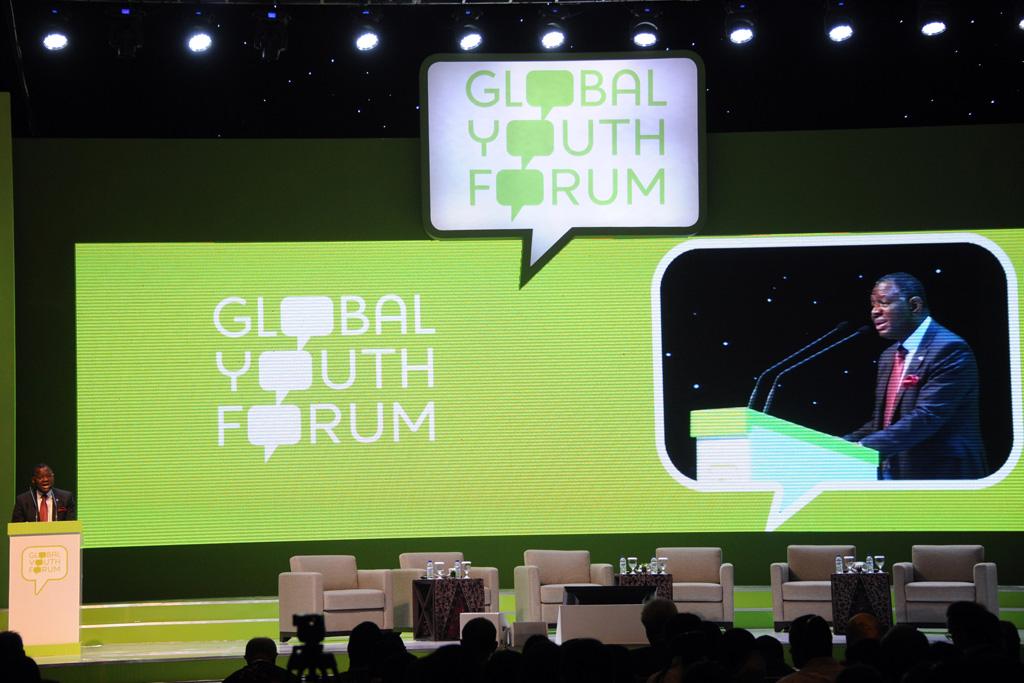Op-Ed: Empowering youth to own their futures
Executive Director of UNFPA Babatunde Osotimehin delivers his speech during the Global Youth Forum in Nusa Dua on Bali island on December 4, 2012. The ICPD Beyond 2014 Global Youth Forum is held from December 4-6.
Suzanne Petroni directs the Gender, Population and Development program at the International Center for Research on Women. She serves on the board of directors of Advocates for Youth and sits on the International Steering Committee for the ICPD Global Youth Forum. Meredith Waters is a senior at George Washington University majoring in public health and was selected by the United Nations as a Respondent for the Global Youth Fourm in Bali. She is also a member of the International Youth Leadership Council at Advocates for Youth.
Half of the world’s population is under 30 years old, and these youth comprise the most well-informed and well-connected generation the world has ever known.
We have the fortune of joining nearly 1,000 of these youth in Bali, Indonesia this week – not sightseeing, but formulating the international development agenda for the future.
As the world heads toward the twentieth anniversaries of the major international development conferences of the 1990s and the conclusion of the Millennium Development Goals in 2015, the United Nations has brought together young leaders and experts on youth from around the world for the ICPD Global Youth Forum.
Young people and their allies from 190 countries will discuss how they – and the rest of the international community – should address the many challenges and opportunities they face. And as the US Agency for International Development recently acknowledged in its first ever youth policy, how young people act on these challenges and opportunities will ultimately affect the fate of us all. This is the first-ever forum asking young people what they recommend be included in the United Nations’ next development agenda as they set the stage for international policy for the next 20 years.
Just yesterday, 900 youth leaders from around the world arrived in Bali. Here, we will chart a path forward ensuring young people’s right to lead healthy lives and promote their overall well-being. This includes better access to the information and services necessary to prevent unwanted pregnancy, sexually transmitted infections, violence, and alcohol and drug abuse. We want to change the course for adolescents and youth, who currently comprise the majority of those newly infected with HIV/AIDS, and who too frequently face too early and unwanted pregnancy. A live feed of the forum is available here.
In many developing countries, girls are forced to marry shortly after – and sometimes even before – puberty, often to much older men. The UN estimates that in the coming decade, nearly 142 million girls will be married before their 18th birthday. Young women face increased risk of sexual violence, too early and unwanted pregnancy and maternal mortality. And young people everywhere face constraints and taboos related to their sexuality, which often limit their ability to simply be themselves.
This week we will consider how best to provide opportunities for decent work and quality education to an ever-growing population of youth. According to the World Bank, 67 million children of primary school age and 72 million of lower secondary school age worldwide did not attend school in 2009. Without the education they need to survive and thrive in a modernizing world, young men and women will not be able to contribute fully to their societies.
Our mandate in Bali thus includes considering how societies can respect young people’s sexuality, uphold their rights, and improve gender equality, while supporting youth to act responsibly on their own behalf.
As they have in Bali, young people must continue to take leadership roles and become agents of change in driving the international public health and development agenda. Experience shows us that the most effective programs and policies targeting youth are designed, implemented and evaluated by youth. Governments and civil society must therefore promote and provide opportunities for young people to participate fully in decisions that affect them.
Finally, we will work toward a time when young people can take ownership of their futures, which means authentic, honest and meaningful youth-adult partnerships.
Those of us attending the Global Youth Forum all hold a common belief – that accurate information, education and services for young people will lead to healthy and productive decision-making for themselves and their communities. And it is just as important for communities to support changes in social norms in order to foster young people’s empowerment.
Young people around the world, including those who have joined us in Bali this week, can lead us toward a healthier, more equitable and more sustainable future. Join us in enabling them to do so.
We want to hear your feedback so we can keep improving our website, theworld.org. Please fill out this quick survey and let us know your thoughts (your answers will be anonymous). Thanks for your time!
